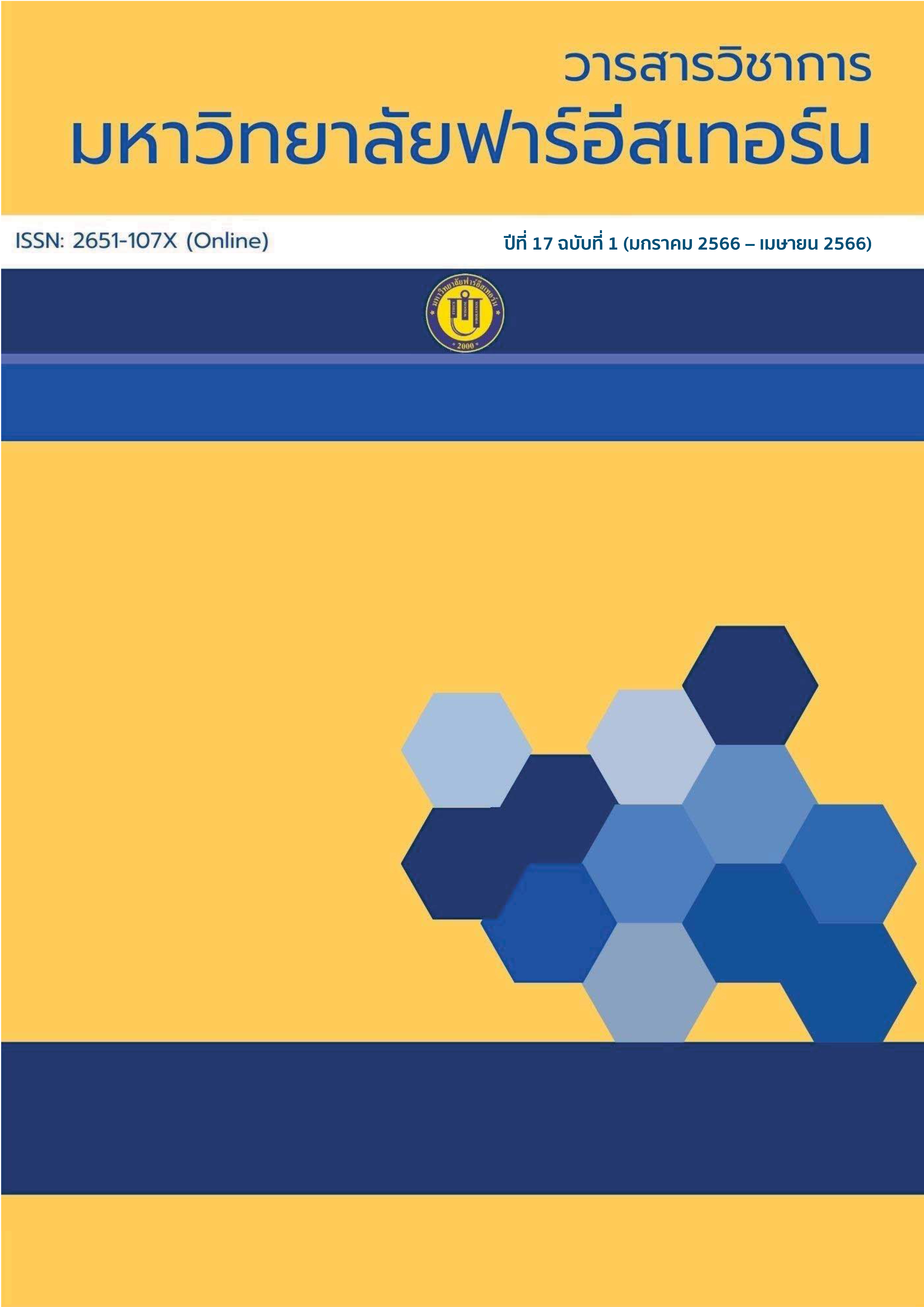Guidelines for the Development of Desirable Characteristics of Youth Entrepreneurs in the Educational Context
Main Article Content
Abstract
The purposes of this research article are as follows – 1) To study the desirable characteristics of entrepreneurs, 2) To study the conditions of desirable characteristics of entrepreneurs, and 3) To suggest means for developing desirable characteristics of young entrepreneurs in educational context. In this research, the researcher has employed documentary research, which is a qualitative research method, from different sources, which include 77 topics from theses, research articles, academic articles, and books, altogether. The result is demonstrated as follows – 1) Having synthesized 17 documents, it was found out that the desirable characteristics of entrepreneurs consist of 5 aspects, which include creativity aspect, innovativeness aspect, enterprise aspect, aspiration for success aspect, and proactive working style aspect, 2) The conditions of developing desirable characteristics of entrepreneurs are found to include 5 aspects, which include creativity, innovativeness, enterprise, aspiration for success, and proactive working style. 3)Means for developing desirable characteristics of young entrepreneurs in educational context, from synthesizing 30 documents, consists of 5 aspects – 5 items for creativity, 4 items for innovativeness, 4 items for enterprise, 4 items for aspiration for success, and the other 4 items for proactive working style – all summed up to 21 items in total. The suitability of means for development is highly suitable as a whole ( =4.48, S.D.=0.55). The aspects with the highest average score are the characteristics-developing means for aspiration for success and proactive working style (
=4.58, S.D.=0.52;
=4.58, S.D.=0.52) The aspect with the second highest score is the characteristics-developing means for innovativeness (
=4.50, S.D.=43). The aspect with the lowest average score is the characteristics-developing means for creativity (
=4.33, S.D.=0.85). The research result can be concluded that the suitable way for the development of desirable characteristics of youth entrepreneurs is arranging various kinds of activities in the institute, allowing the learners to practice inventing and creating innovations, fostering innovational ability, designing learning methods that encourage the learners to plan, arranging learning activities that allow the learners to realize the importance of entrepreneurship, and arranging activities emphasizing self-analysis.
Article Details

This work is licensed under a Creative Commons Attribution-NonCommercial-NoDerivatives 4.0 International License.
1. Any views and comments in the Journal of Social Innovation and Lifelong Learning are the authors’ views. The editorial staff have not to agree with those views and it is not considered as the editorial’s responsibility.
2. The responsibility of content and draft check of each article belongs to each author. In case, there is any lawsuit about copyright infringement. It is considered as the authors’ sole responsibility.
3. The article copyright belonging to the authors and The Far Eastern University are copyrighted legally. Republication must be received direct permission from the authors and The Far Eastern University in written form.
References
ชนัญญา สุขสมวัฒน์, สุวิมล ว่องวาณิช, และ ชยุตม์ ภิรมย์สมบัติ. (2563). แนวทางการจัดการเรียนการสอนเพื่อส่งเสริมความเป็นผู้ประกอบการของนักเรียน : คราวด์ซอร์สซิ่ง. วารสารอิเล็กทรอนิกส์ทางการศึกษา, 15(2), 1-14. https://so01.tci-thaijo.org/index.php/OJED/article/view/242571
ณัฐวุฒิ วิเศษ. (2554). คุณลักษณะและความตั้งใจที่จะเป็นผู้ประกอบการของนักศึกษาสาขาการเป็น ผู้ประกอบการ ในเขตกรุงเทพมหานคร (รายงานการวิจัย). นนทบุรี: มหาวิทยาลัยราชพฤกษ์. http://www.rpu.ac.th/Library_web/doc/RC_RR/2552_Manage_Nuttavut.pdf
ทิบดี ทัฬหกรณ์ และ ประสพชัย พสุนนท์. (2562). คุณลักษณะของผู้ประกอบการที่ส่งผลต่อความสำเร็จในธุรกิจร้านค้าบริษัททรูคอร์ปอเรชั่นจำกัด (มหาชน). วารสารอิเล็กทรอนิกส์การเรียนรู้ทางไกลเชิงนวัตกรรม, 9(1), 106-117. https://so01.tci-thaijo.org/index.php/e-jodil/article/view/204675
ธาดาธิเบศร์ ภูทอง และ พรญาณี หิรัญศุภโชติ. (2562). แบบจำลองความสัมพันธ์เชิงสาเหตุของความตั้งใจที่จะเป็นผู้ประกอบการรุ่นเยาว์ที่ใช้นวัตกรรมเทคโนโลยีที่สร้างความพลิกผันของนักศึกษาหญิงในระดับปริญญาตรี. Veridian E-journal, 12(4), 384-412. https://he02.tci- thaijo.org/index.php/Veridian-E-Journal/article/view/176900
นริศรา ทองยศ, ดาวรุวรรณ ถวิลการ, และ กนกอร สมปราชญ์. (2565). แนวทางการพัฒนาความเป็นผู้ประกอบการใหม่ของนักศึกษา วิทยาลัยอาชีวศึกษา. วารสารวิชาการธรรมทรรศน์, 22(3), 281-291. https://so06.tci-thaijo.org/index.php/dhammathas/article/view/252066
พัทธมน ธุระธรรมานนท์. (2564). ปัจจัยธุรกิจ คุณลักษณะของผู้ประกอบการ และการสร้างความได้เปรียบทางการแข่งขันที่นำไปสู่ความสำเร็จของธุรกิจเบเกอรี่บนออนไลน์ [วิทยานิพนธ์ปริญญามหาบัณฑิต, มหาวิทยาลัยศรีนครินทรวิโรฒ]. http://ir- ithesis.swu.ac.th/dspace/bitstream/123456789/1540/1/gs631110144.pdf
วรัทยา ธรรมกิตติภพ และ กรปภา เจริญชันษา. (2562). คุณลักษณะของผู้ประกอบการสร้างสรรค์ และกิจกรรมเตรียมความพร้อมสู่การเป็นผู้ประกอบการสร้างสรรค์ ภายใต้แนวคิดเศรษฐกิจสร้างสรรค์. วารสารการศึกษาและการพัฒนาสังคม, 14(2), 109-123. http://ojslib3.buu.in.th/index.php/social/article/view/6323
วิไล พึ่งผล และ วิโรจน์ เจษฎาลักษณ์. (2561). คุณลักษณะความเป็นผู้ประกอบการรุ่นใหม่ที่ส่งผลต่อการดำเนินธุรกิจผ่านความได้เปรียบทางการแข่งขันของธุรกิจสตาร์ตอัพ. วารสารวิทยาลัยดุสิตธานี, 12(2), 303-318. https://so01.tci-thaijo.org/index.php/journaldtc/article/view/126011
ศิริวัฒน์ ตั้งทรงเจริญ. (2558). คุณลักษณะของการเป็นผู้ประกอบการของนักศึกษาระดับปริญญาโทด้านบริหารธุรกิจในเขตกรุงเทพมหานคร [การค้นคว้าอิสระปริญญามหาบัณฑิต, มหาวิทยาลัยธรรมศาสตร์]. http://ethesisarchive.library.tu.ac.th/thesis/2015/TU_2015
_5702030767_2923_1899.pdf
สมคิด บางโม. (2555). การเป็นผู้ประกอบการ (พิมพ์ครั้งที่ 5). กรุงเทพฯ: เอสเคบุ๊ค.
สมพร ปานดำ. (2563). การพัฒนาสมรรถนะผู้เรียนวิชาชีพ สาขาช่างอุตสาหกรรมและการติดตามและประเมินผลในศตวรรษที่ 21. วารสารวิจัยและนวัตกรรมการอาชีวศึกษา, 4(1), 47-57. https://so06.tci-thaijo.org/index.php/ve-irj/article/view/241998
สานิต ศิริวิศิษฐ์กุล และ นันทนา ชวศิริกุลฑล. (2560). คุณลักษณะของผู้ประกอบการยุคไทยแลนด์ 4.0 ที่ส่งผลต่อความสำเร็จทางธุรกิจสินค้าหนึ่งตำบลหนึ่งผลิตภัณฑ์ ในจังหวัดปทุมธานี. https://www.northbkk.ac.th/research_/?news=research&id=000423
สุธาสินี โพธิ์พันธ์. (2558). คุณลักษณะผู้ประกอบการที่พึงประสงค์ของธุรกิจหนึ่งตำบลหนึ่งผลิตภัณฑ์ จังหวัดพระนครศรีอยุธยา [วิทยานิพนธ์ปริญญามหาบัณฑิต, มหาวิทยาลัยราชภัฏวไลยอลงกรณ์].
สุธีรา อะทะวงษา. (2556). คุณลักษณะของการเป็นผู้ประกอบการ และลักษณะของสถานประกอบการ ที่มีผลต่อการเจริญเติบโตของวิสาหกิจขนาดกลางและขนาดย่อม ของประเทศไทย [วิทยานิพนธ์ปริญญามหาบัณฑิต, มหาวิทยาลัยธุรกิจบัณฑิตย์]. https://dric.nrct.go.th/index.php?/Search/SearchDetail/271115
สุพจน์ มัสยามาศ และ ศักร์ระภีร์ วรวัฒนะปริญญา. (2563). คุณลักษณะของผู้ประกอบการที่ประสบความสำเร็จในธุรกิจอุตสาหกรรมเฟอร์นิเจอร์ไม้เพื่อการส่งออก. วารสารศรีปทุมปริทัศน์ ฉบับมนุษยศาสตร์และสังคมศาสตร์, 20(1), 62-77. https://so05.tci-thaijo.org/index.php/spurhs/article/view/235137
Arogundade, B. B. (2011). Entrepreneurship education: An imperative for sustainable development in Nigeria. Journal of emerging trends in educational research and policy studies (JETERAPS), 2(1), 26-29.
Coulter, M. K. (2003). Entrepreneurship in Action (2nd ed.). Upper Saddle River, New Jersey: Prentice Hall.
Cumming, Thomas. G., & Worley, Christopher G. (2008). Organization Development & Change (8th ed.). USA: South-Western.
Harms, R. (2009). A Multivariate Analysis of the Characteristics of Rapid Growth Firms, Their Leaders, and Their Market. Journal of Small Business and Entrepreneurship, 22(4), 429-454. https://doi.org/10.1080/08276331.2009.10593464
Hatten, T. S. (2006). Small Business Management: Entrepreneurship and Beyond (3rd ed.). Boston: Houghton Mifflin.
Holienka, M. (2014). Youth entrepreneurship in Slovakia: a GEM based perspective. Comenius Management Review, 8(2), 41-50. https://www.researchgate.net/publication/306917464_Youth_entrepreneurship_in_Slovakia_a_GEM_based_perspective
Lackeus, M. (2015). Entrepreneurship in education what, why, when, how. OECD. https://www.oecd.org/cfe/leed/BGP_Entrepreneurship-in-Education.pdf

